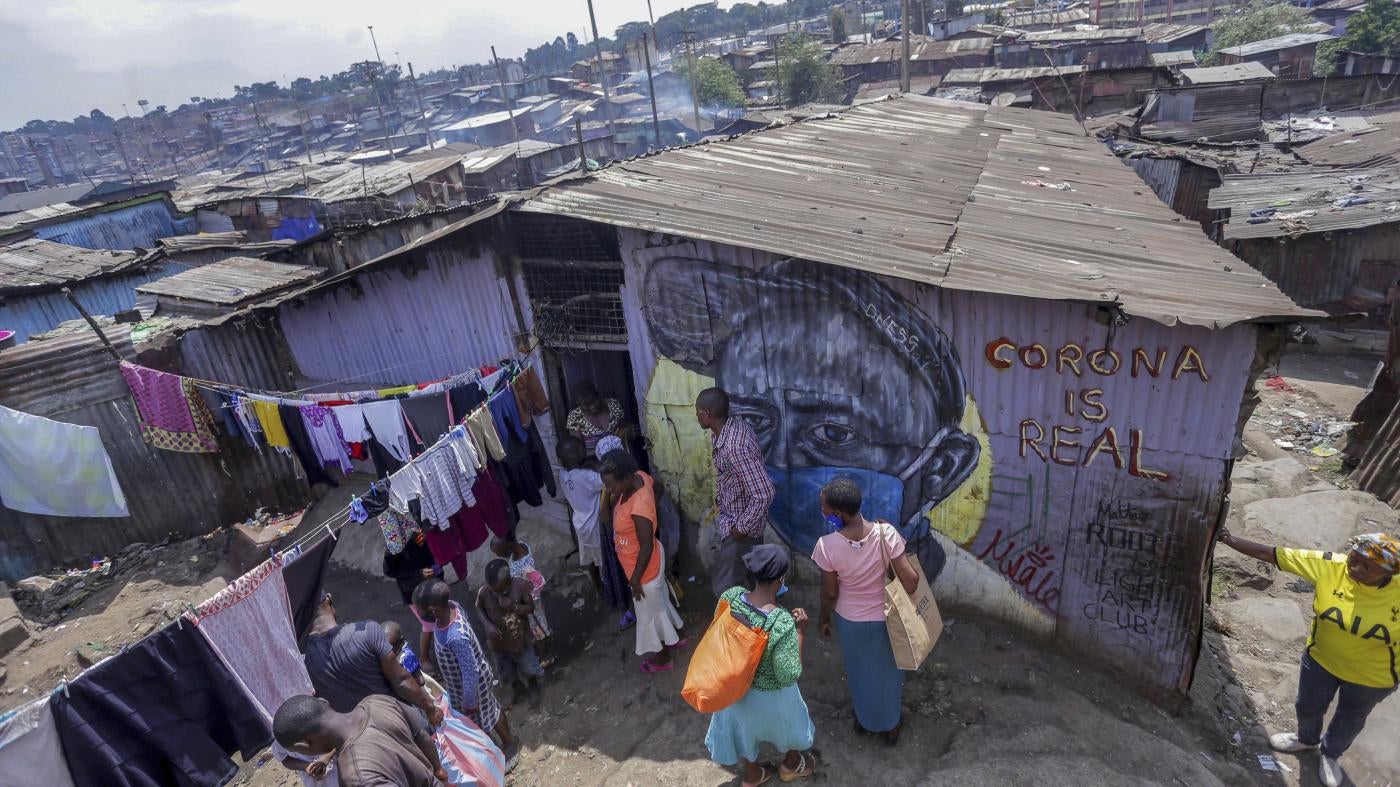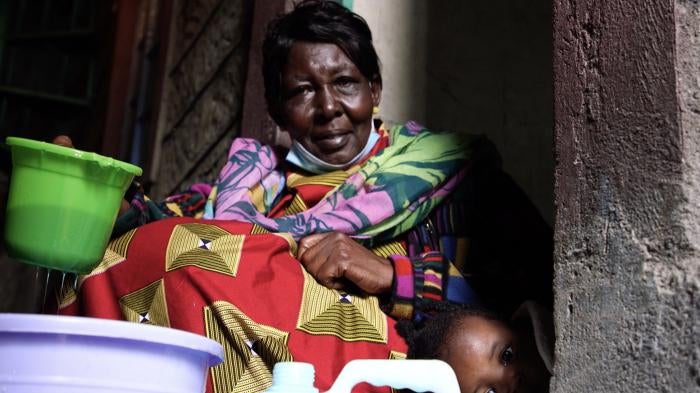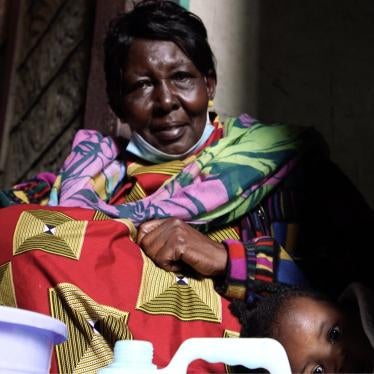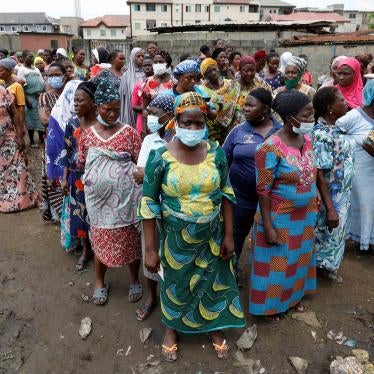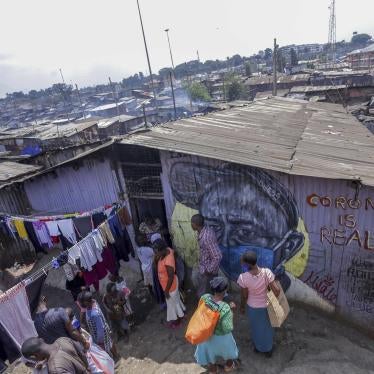As a busy community volunteer, representing almost five thousand households to the local government administration, it was her job to worry.
Mukuru Kayaba is an informal settlement. The small houses constructed from mabati, corrugated iron sheets, are closely packed. From above, television antennae and electrical wires wind and knit through the brown, grey, and blue roofs. Slim water drainage channels run alongside the busy narrow paths within the neighborhood. Mukuru Kayaba has been Jane’s home for 30 years, during which she’s had children, grandchildren, and built a reputation as a respected leader. Jane’s clear deep voice and hearty laughter is a comforting, familiar neighborhood feature. Her phone buzzes, pings, and rings throughout the day, and sometimes through the night.
When Kenya announced its cash transfer program on May 23, 2020, intended to ease the financial blow that hit the poorest communities during the pandemic, Jane was relieved to see that people would get the assistance they needed. But the cash transfer program never reached many of those who most needed it.
As the owner of a shop where she sells vegetables, dried food, and other groceries, Jane had seen the need first-hand. Before the pandemic, people stopped by to check-in about neighborhood matters, and to clarify about government announcements or other initiatives. The path in front of her shop used to have busy foot traffic from dawn until late in the evenings, as people rushed to and from work. But when the Covid-19 restrictions were announced, she opened her shop later and closed earlier. There were fewer people who had money to spend, even on food.
When the government rolled out registration of the cash transfer program in April 2020, community leaders like Jane registered the names and contact information of the most vulnerable in their communities, targeting mainly households headed by orphaned children, sick and bedridden people, people with disabilities, and those who were not already benefiting from other government programs that predated Covid-19. Those registered were to receive money weekly from the government for 35 weeks in 21 counties across Kenya, which included Nairobi County.
But Human Rights Watch found that the program was riddled with irregularities. Some people who were registered did not receive the cash. Even among those who received it, there were glaring disparities, with majority receiving the weekly transfer of Ksh1,000 ($10) just once, others twice or four times, as opposed to the 35 times the government promised. Many vulnerable families, including those who had been enrolled, were completely left out of the program with no option to appeal or challenge the decision to leave them out. The Covid-19 cash transfer program also failed to meet the basic human rights criteria of ensuring that everyone was guaranteed an adequate standard of living, including the right to food and shelter, as many people went hungry while others were evicted for nonpayment of rent despite the government implementing the cash transfer program for eight months.
Jane’s community was no exception.
Many residents in Mukuru Kayaba are daily wage laborers who lost their income when the government instructed everyone to stay at home. Others draw their livelihoods from selling wares on the street or washing clothes and cleaning houses in the neighboring middle-income South B estate. Many lost their livelihoods when businesses shut down due to government restrictions. The threat of starvation was real, and the news that the government would send money to the most vulnerable offered a ray of hope. Jane said she frequently spoke with families who told her they had cooked their last cup of ugali, a type of bread made of maizemeal. Others told her they could only boil water for the younger children because they had nothing to cook. Although some house owners waived rent collection, many more evicted their tenants, putting them out on the narrow paths in the neighborhood. Contracting Covid-19 was a secondary fear for people sleeping hungry.
When a few people started receiving the cash, Jane was glad that much-needed help had finally arrived. But many more need urgent financial aid.
Soon, she had to deal with questions from people who did not receive the funds even though she’d registered them. More asked her why the funds did not come in every week. Others asked her about the varying amounts that people received, or why the funds stopped arriving. Jane was frustrated because she didn’t have answers to these questions. She tried to placate her neighbors, asking them to be patient. She brought these questions to government administration officials in the neighborhood who told her that their role ended after they completed the registration. Jane did not know who else she could ask.
There has been no investigation into the irregularities in the cash transfer program, and it’s unclear whether all the funds meant for vulnerable communities reached them. With government restrictions still in place due to the rising numbers of Covid-19 infections, many sectors of the Kenyan economy will take long to recover, and the low-income communities are still in dire need of support. Although nothing has changed in terms of Covid-19 infections and restrictions, the authorities have stopped the cash transfers and discussion on the impact this has on the low-income communities has died. Yet questions still hang uncomfortably in the air as Jane speaks with her community about the situation. She tries to encourage them, but it’s hard to imagine a bright future, the end of the pandemic, or the return to normalcy, when the next meal is not guaranteed.
